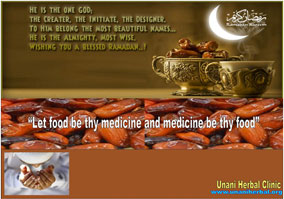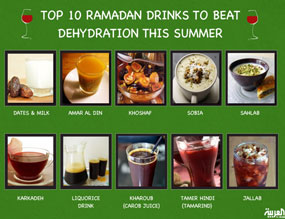Issue :- 6
RAMADAN AND HEALTH

The month of Ramadhan is not like any other month; its purpose is to rid man of those habits which he has accumulated throughout the rest of the year. It is a month that prepares man for the remaining eleven months by teaching him discipline and self control. Thus, Allah has made some acts which are beloved to man, like eating, drinking and fulfilling one’s desires, Haraam. If man can control these desires in this month, which are usually permissible for him, then he can surely control himself from other desires which are not permissible throughout the remaining months. This blessed month has been sent by Allah to His bondsmen so that can create a connection and draw closer to Allah by reaping the many rewards that lie in this month. A person who has been given the opportunity to be present in this month can take this as a sign that Allah Ta’ala has given him another opportunity to draw closer to Him and earn His paradise through worship in this month.In this month we will be given many opportunities, as mentioned above to reform ourselves and seek forgiveness for our bad sins. This is a month of reformation and self reflection, where a believer can ponder of over spirituality and piety and bring a change for the better.
Incredible Health Benefits Of Fasting
Many people observe fasting as a religious obligation but only few know the health benefits it has. Fasting is a good practice, if properly implemented. It promotes elimination of toxins from the body, reduces blood sugar ans fat stores. It promote healthy eating habits and boost immunity.
- Fasting Promotes detoxification Processed foods contain lots of additives. These additives may become toxins in the body. Some of them promote produc tion of advanced glycation end products (AGEs). Most of these toxins are stored in fats. Fat is burnt during fasting, especially when it is prolonged. And the toxins are released. The liver, kidneys and other organs in the body are involved in detoxificati on.
- Fasting Rests Digestive System During fasting, the digestive organs rest. The normal physiologic functions continue especially production of digestive secretions, but at reduced rates. This exercise helps to maintain balance of fluids in the body. Breakdown of food takes place at steady rates. Release of energy also follows a gradual pattern. Fasting however does not stop production of acids in the stomach. This is reason patients with peptic ulcer are advised to approach fasting with caution.
- Fasting Resolves Inflammatory Response Some studies show that fasting promotes resolution of inflammatory diseases and allergies. Examples of such inflammatory diseases are rheumatoid arthritis, arthritis and skin diseases such as psoriasis. Some experts assert that fasting may promote healing of inflammatory bowel diseases such as ulcerative colitis.
- Fasting Reduces Blood Sugar Fasting increases breakdown of glucose so that the body can get energy. It reduces production of insulin. This rests the pancreas. Glucagon is produced to facilitate the breakdown of glucose. The outcome of fasting is a reduction in blood sugar.
- Fasting Increases Fat breakdown The first response of the body to fasting is break down of glucose. When the store of glucose is exhausted, ketosis begins. This is break down of fats to release energy. The fats stored in kidney and muscles are broken down to release energy.
- Fasting Corrects high blood Pressure Fasting is one of the non-drug methods of reducing blood pressure. It helps to reduce the risk of atherosclerosis. Atherosclerosis is clogging of arteries by fat particles. During fasting glucose and later, fat stores are used to produce energy. Metabolic rate is reduced during fasting. The fear-flight hormones such as adrenaline and noradrenaline are also reduced. This keeps the metabolic steady and within limits. The benefit is a reduction in blood pressure.
- Fasting Promotes Weight loss Fasting promotes rapid weight loss. It reduces the store of fats in the body. However fasting is not a good weight loss strategy. Reducing fat and sugar intake, and increasing fruits and rest are better measures to achieve weight reduction.
- Fasting Promotes Healthy diet It has been observed that fasting reduces craving for processed foods. It promotes desire for natural foods, especially water and fruits. This is one way fasting promote healthy lifestyle.
- Fasting Boosts Immunity When an individual is on balanced diet in between fasts, this can boost immunity. Elimination of toxins and reduction in fat store also helps the body. When individuals take fruits to break a fast, they increase the body's store of essential vitamins and minerals. Vitamins A and E are good antioxidants readily available in fruits. They help to boost immunity.
- Fasting May Help to Overcome Addictions Fasting can help addicts reduce their cravings, for nicotine, alcohol, caffeine and other substance abuse. Although there are other regimens required to resolve addictions, fasting can play a role. Despite these benefits, fasting has some demerits. It may cause reduction in body water called dehydration. This leads may lead to headaches and even trigger migraines in predisposed persons. It may worsen heartburn and peptic ulcer. Pregnant women, nursing mothers, malnourished people, and individuals with cardiac arrhythmias, renal or liver problems are advised not to fast.

Before delving into the dos & don’ts of Ramaan diet habits, let us first ground ourselves in the different categories of food content we come across.
- Complex carbohydrates:starchy foods which release energy slowly throughout the day, as they take longer to digest and absorb into our bloodstream. This helps to keep us active through the day. These include potatoes, wheats, rice, couscous, grains, oats, cereals, fruits, and many vegetables. Wholemeal or wholegrain variations are the best, as they contain a good amount of fibre too. These foods are a key foundation to a balanced diet.
- Simple sugars:high sugar content foods which rapidly absorb into your bloodstream. They can be used to release instant energy when we are exercising or active. However, when taken in excess they remain mostly unused and are subsequently stored as fats in the body. High amounts of sugar in the blood can cause us to become less sensitive to the insulin our body produces, thus increasing our diabetes risk. Simple sugars are also absorbed by bacteria in the mouth which release substances harmful to teeth. Examples include: sweets (chocolate, Indian sweets), cakes, desserts, concentrated fruit juices, energy drinks, many ‘low-fat’ varieties which compensate on taste by adding plenty of sugar!
- Protein: these form the building blocks of our body, involved with growth and repair. Studies have also linked dietary proteins to increased satiety, keeping hunger at bay!Examples include meat, poultry, fish, eggs, dairy products, nuts, beans, seeds.
- Fats:in small amounts, they are important to many bodily functions and are a source of energy. An excess of saturated fats however increase harmful cholesterol levels, contributing to an increased risk of heart disease and stroke. Obesity is also associated with some cancers and diabetes. Examples include: animal fats (oils, red meat, poultry skin), full fat milk, cream, cheese, butter, ghee, cakes. Unsaturated and polyunsaturated fats, on the other hand help lower harmful cholesterol when taken in moderation. They include: oily fish, olive oil, vegetable oils, avocados, peanuts.
- Fibre: important in maintaining a healthy digestive system. They add bulk to our food and help us feel less hungry for longer. They are found in vegetables, fruit, wholemeal grains, cereals. Where possible, eat vegetables and fruit with their skin, more fibre to your diet!
- Vitamins and minerals: we need these in small amounts to keep healthy and they serve a huge number of functions in our body. Easily found in a combination of fruits, vegetables and meat/poultry.
20 practical health tips for Ramadan
In light of the information above, the following are general pointers related to our fasting. This list is not exhaustive, and I would encourage seeking advice from your GP to make an individualised plan for your fasting.
- Begin iftar with dates, providing you with an immediate source of energy. Rehydrate yourself with plenty water.
- Isotonic drinks or natural juice drinks when breaking the fast are a good source of minerals, salts, and vitamins.
- Resist the urge to feast as much as you can, as quickly as you can! Research has shown that even food-associated words appear much brighter to the hungry. After a day of fasting and discipline, resist this instinct and illusion – aim to eat in moderation.
- Avoid high-fat, high-sugar content, and highly-processed food (e.g. white wheat) – fried food, ghee, pakoras, biryanis, Indian sweets, halawas (and the list goes on..!). By iftar time, our bodies are working to preserve as much energy possible. Therefore, excessive fatty food and sugars will be rapidly added to body fat reserves.
- Salty food at iftar and suhur will cause dehydration and make you feel increasingly thirsty.
- After Maghrib salah, have a well-balanced meal containing all of the food groups mentioned
- Meals with slow release carbohydrates will keep you well energised for a night of oibadah. Include sources of fibre, which will keep your bowels working and healthy after resting during the day.
- Fibre and proteins keep you feeling full for longer – an important part of your meal plan.
- Staying well hydrated and eating sources of fibre will help prevent constipation in Ramadan
- Cereals, salads, fruit and vegetables are excellent replacements for oily curries and fried snacks.
- Eat in moderation, a heavy stomach rarely agrees with a night of fruitful oibadah
- The oadith regarding the breath of the fasting person does not justify poor dental hygiene. Brushing, flossing before tarawih is advised, for the sake of fellow worshippers too! Excessive sugary snacks and drinks are also harmful for teeth.
- After iftar, stay well hydrated by taking regular sips of water every half hour, or a cup full or more every hour.
- Physical exercise immediately after iftar may not be a good idea, as our blood flow is being directed to our digestive system at that time.
- Please be mindful of the sugar content in caffeinated energy drinks. With tea and coffee, again moderation is key.
- Take the strength and discipline developed during fasting to give up smoking this Ramadan. Smoking cessation services in the NHS can help you reach this goal.
- Do not skip suhur An important sunnah and opportunity to nourish your body with a balanced diet containing complex carbohydrates, fibres, proteins, good fats we have discussed earlier.
- Try to fit in adequate time for napping. Planning rest well will allow us to make the most of our time in Ramadan. Even sleep can be rewarded if intended to recuperate in preparation for more ibadah!
- 19. If you are taking any regular medication, have any health conditions, are pregnant or breastfeeding, it is very important to consult with your doctor first before planning your fasts. Please make sure you encourage family members to do the same.
- 20. Our Deen excuses those who are unwell or ill from fasting. Please spend time learning the fiqh of fasting from a trusted local imam, and ask when faced with any questions. We ask Allah Jalla wa ‘Ala to accept our fasting and grant us the ability to maximise our time in Ramadan.

Foods to avoid
- deep-fried foods – such as pakoras, samosas and fried dumplings
- high-sugar and high-fat foods – including sweets such as gulab jamun, rasgulla and balushahi
- high-fat cooked foods – such as parathas, oily curries and greasy pastries
Cooking methods to avoid
- deep frying
- frying
- excessive use of oil
Dates

Although three dates are eaten at the start of Iftar every day during Ramadan for spiritual reasons, they also come with the added bonus of multiple health benefits. One of the most important aspects of fasting is getting the right amount of energy, and considering an average serving of dates contains 31 grams of carbohydrates, this is one of the perfect foods to give you a boost. Dates are also a great way of getting some much-needed fibre, which will aid and improve digestion throughout Ramadan. Add to that their high levels of potassium, magnesium and B vitamins, and it quickly becomes apparent that dates are one of the healthiest fruits out there.
Top 10 Ramadan drinks to beat dehydration this summer
 For Consultation click here
For Consultation click here
Copyright 2014 Unani Herbal
If you wish to cancel your subscription to this newsletter click here





